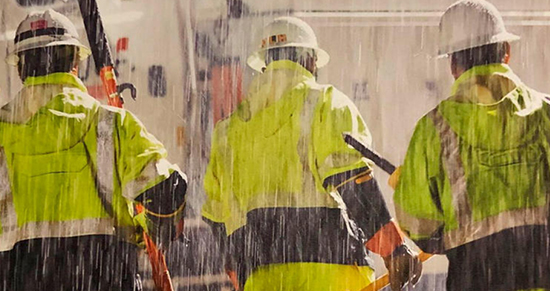Keeping Safe in Stormy Weather
When a storm is headed your way, make sure that you are prepared. As the bad weather approaches, stay informed about what the next three days will bring. Prepare for flooding by moving your valuables to upper floors. Always keep the fuel tank on your vehicles full and the battery charged if you drive an electric vehicle.

Stay Safe During the Storm
- Stay away from and do not touch any downed power lines or equipment, and report them immediately to the police or fire department and SDG&E.
- If evacuating during a storm, do not attempt to turn off power at the breaker box as it will automatically trip in the event of water damage. Gas service is located underground – except for the meter – and will not be affected by water.
- Stay informed of the weather conditions.
- Avoid low-lying areas that might flood.
- Do not attempt to cross swift-moving water that is above your knees.
- If your vehicle stalls in the water, abandon it immediately. Two feet of water is enough to carry away most automobiles.
- Restrict telephone use.
- Prepare an evacuation kit that includes personal hygiene items, clothes, bedding and medication.
- Check on your neighbors, especially the elderly and disabled, if it is safe to do so.
- Dial 911 only if you have a life-threatening emergency.
- Avoid making unnecessary trips. If you must go, dress in warm, loose layers with sturdy shoes, and let others know where you are going.
- Keep children safe and away from high water, storm drains or viaducts.
When Lightning Strikes a Power Line
Fortunately, the San Diego region has some of the lowest cloud-to-ground lightning strikes in the nation. When lightning does strike a powerline, the electric currents from the lightning will follow the path of least resistance to ground. SDG&E’s facilities, including poles, are designed to provide a low resistance path to ground. Although the mechanisms for diverting lightning surges vary, the goal is the same — to have the lightning flow through our equipment and not yours.
Learn more about lightning mitigation
Post-Storm Safety
- Do not touch any downed power lines or broken gas lines, and report them immediately to the police or fire department.
- Contact SDG&E or a licensed professional to relight your appliances and pilot lights. Do not attempt to turn your gas back on yourself.
- Do not use electrical equipment in wet areas.
- Do not use flames. Use flashlights, not lanterns, matches or candles.
- Avoid making unnecessary trips. If you must go, dress in warm, loose layers with sturdy shoes, and let others know where you are going.
- Discard contaminated food.
- Boil or purify drinking water.
- Stay informed of the weather conditions and relief efforts.